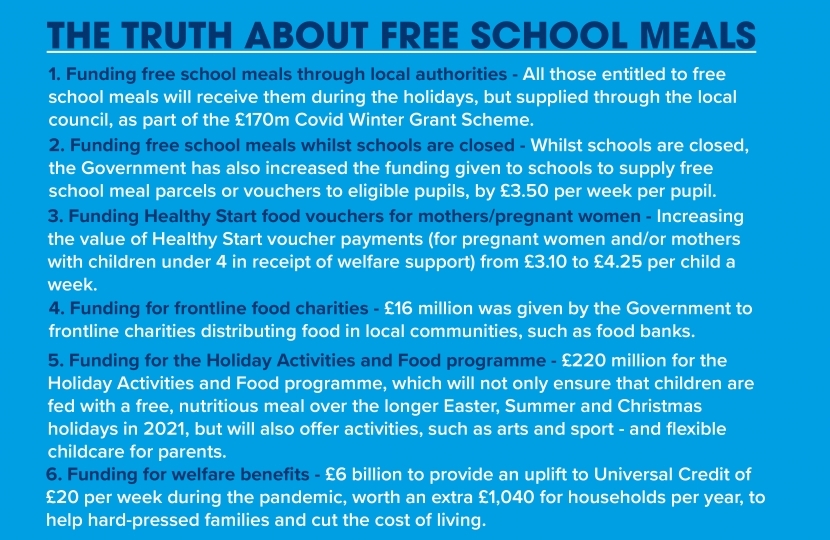
There has been a lot of misreporting about the provision of free school meals over the February half-term. I thought it would be useful to set out what exactly the Government is doing to help disadvantaged children with food, not just in half-term, but across the board.
In November, the Government announced a package worth more than £500 million to combat child food hunger. Of that £500 million, local authorities were given £170 million to help families in need (80% of which was ringfenced for food and bills).
You will be aware that I voted against my party last October, in favour of extending free school meals to children over the school holidays. However, the Government then came up with a much more comprehensive package, worth more than £500 million which I strongly welcome. At the time, the Opposition put forward a proposal to spend just £40 million.
The Government’s food package is as follows:
- Funding free school meals through local authorities
All those entitled to free school meals will receive them during the holidays, but supplied through the local council, as part of the £170m Covid Winter Grant Scheme. This fund is ring-fenced, with at least 80% earmarked to support the hardest-hit families with food and bills, up to the end of March 2021. This obviously includes February half-term.
The scheme is run by councils, so that schools do not have to have staff on the premises or distribute food parcels outside of term-time.
The Government guidance to local authorities on distributing the funding also gives councils the flexibility to provide food and other essentials to a wider range of vulnerable households, beyond those with children eligible for free school meals. This is particularly important for those families who may find themselves in hard times for the first time, as a result of the pandemic.
The Covid Winter Grant Scheme comes on top of last year’s £120 million Summer Food Fund, which covered the cost of vouchers for disadvantaged families to spend on food in supermarkets, during the Summer holidays.
- Funding free school meals whilst schools are closed
Whilst schools are closed, the Government has also increased the funding given to schools to supply free school meal parcels or vouchers to eligible pupils, by £3.50 per week per pupil, recognising the additional costs incurred by schools of supplying free school meals in the pandemic. The total value of free school meals is up to £15 per pupil per week, to cover 5 nutritious lunches. Schools have an option either to use local vouchers, or use the national voucher scheme, available from next week.
The Government guidance to schools on providing free school meal parcels during the lockdown has been produced by the Lead Association for Catering in Education and Public Health England and must also comply with School Food Standards. The companies that did not distribute parcels properly, in line with this guidance, were clearly ripping off schools, families and the taxpayer. However, the Children’s Minister has now said that the Department for Education will look at the guidance to see if it can be strengthened further.
- Funding Healthy Start food vouchers for mothers/pregnant women
Finally, the Government is also increasing the value of Healthy Start voucher payments (for pregnant women and/or mothers with children under 4 in receipt of welfare support) from £3.10 to £4.25 per child a week. This increase of more than a third, will help low-income families to buy fresh milk and fruit and vegetables, and help to boost children’s health and readiness for school.
- Funding for frontline food charities
£16 million was given by the Government to frontline charities distributing food in local communities, such as food banks.
- Funding for the Holiday Activities and Food programme
The Government has committed £220 million for the Holiday Activities and Food programme, which will not only ensure that children are fed with a free, nutritious meal over the longer Easter, Summer and Christmas holidays in 2021, but will also offer activities, such as arts and sport - and flexible childcare for parents. The programme is being extended to all disadvantaged children, right across the country.
- Funding for welfare benefits
It’s not just food packages the Government has invested in, but £6 billion to provide an uplift to Universal Credit of £20 per week during the pandemic, worth an extra £1,040 for households per year, to help hard-pressed families and cut the cost of living.
A £500 million Hardship Fund was also set up by the Government, distributed by local authorities, to provide council tax relief for vulnerable households during the pandemic.
This package of support was strongly welcomed by food charities. The CEO of food distribution charity, FareShare, Lindsay Boswell, said:
“We welcome the Government’s further financial support on behalf of the 11,000 frontline charities we provide food to in England, who in turn created over 3 million meals a week to help their clients at the height of the first lockdown. Both through this winter, and through the undoubtedly tough economic conditions set to impact the country this coming year, it is vital that we all work together to get help to those most in need.” (1 December 2020)
In addition, Geoff Barton, the highly respected General Secretary of the Association of School and College Leaders (ASCL), also recognised that the Government’s package of support would ensure children receive free school meals over the February half-term in his statement, saying:
“We welcome the announcement of more funding to support disadvantaged families, particularly during school holiday periods.
“The commitment of £170m channelled via local authorities to the end of March appears to address the immediate need to ensure that children do not go hungry over the Christmas and February half-term holidays.” (8 November 2020)


